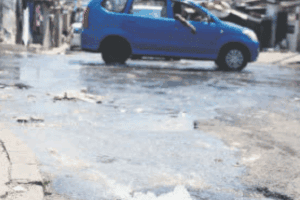Johannesburg's Jukskei River is contaminated to point it could be raw sewage.

The Water Community Action Network (WaterCAN) celebrated the International Day of Action for Rivers on Tuesday by revealing the results of tests done in the Jukskei River in Johannesburg over the past few months, indicating critical levels of E. coli from sewage.
WaterCAN brand manager Ivor Cleary said the organisation – an initiative of the Organisation Undoing Tax Abuse (Outa) – planned to lay criminal charges against the municipal manager for pollution in the Klein Jukskei, the lack of action and improvement at the Bushkoppies and Goudkoppies wastewater treatment works as well as water shedding affecting significant areas in the City of Joburg.
WATCH: KZN sewage leaks a breeding ground for disease, warns expert
“In Johannesburg, the results are not surprising, given that the Zandspruit pump station has been overflowing into the Klein Jukskei sporadically for years.
“The results show high levels of E. coli and faecal coliform bacteria. E. coli upstream was 64 000CFU/100ml [colony-forming unit per 100 millilitres] and downstream of the pump station was over 100 000CFU/100ml, which could be regarded as raw sewage,” he said.
The sewage pouring into the river was so rancid it burned your nose and it was hard to breathe around the riverbank.

Julian Walker, who lives nearthe Zandspruit pump station, said he was worried about the horses and cows that graze in the area and drink river water.
“The sewage has been running into the river nonstop for about six months,” he said.
Walker said he didn’t allow his dog to roam by the river any more because “it isn’t safe”.
The different colours in the water are clearly visible where the sewage pours into the river. “There’s no fish, ducks and no birds left here,” he said.
READ MORE: Water activists aim to draw attention to river pollution
Walker said the river was so contaminated he could make a fortune if he could sell the bacteria in the river.
“The poor quality is a concern for small-scale farmers and fishers as both food and fish could be affected. Joburg water should be tested more frequently and tested downstream to assess the impacts of the overflows and spillage,” he said.
WaterCAN executive manager Dr Ferrial Adam said the water in the river was so polluted it wasn’t safe for humans to even bathe.
“The bacteriological counts in the sampled water were very high and cannot be used for drinking for humans or animals.”

Adam said during a meeting between Joburg Water and the affected residents, it was reported there was a need for partial or total replacement of pipes, but there was no money.
There were talks about plans to build a new Lanseria wastewater treatment plant.
“The challenge is that the pipeline needs four years and the wastewater works need 10 years to complete,” she said.
There was a lack of urgency to deal with sewage spills, Adams claimed, adding government was the biggest polluter of the rivers.
In four to 10 years “the river will be dead”.
NOW READ: Rivers in Kruger National Park now rising again
Support Local Journalism
Add The Citizen as a Preferred Source on Google and follow us on Google News to see more of our trusted reporting in Google News and Top Stories.






